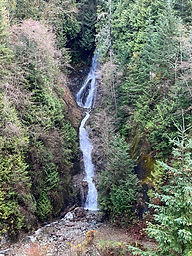Five Weekend Rescues
- kc dyer
- Aug 29, 2023
- 3 min read
Trailhead Closures Don't Mean a Break for LBSAR

Lions Bay Search and Rescue (LBSAR) had a very busy weekend, with five hikers in distress successfully brought down from the mountains, including the final person on Monday morning.
Trailheads and parking may have been shut down in the Village, but the mountain trails remained open and in use.
LBSAR operates under the umbrella of the Emergency Management British Columbia (EMBC), providing both wilderness and urban search and rescue services.
"Dehydration is a recurring theme for this time of year," says Ed Langford, LBSAR Manager. "This past weekend was five calls, three of which were directly related to dehydration, heat stroke and associated fatigue. One was a knee injury, likely due to lack of conditioning, partial dehydration and over-exertion. One occurred concurrently with the first Saturday call, where the subject was lost."
Langford notes that the trail closures are too new to correlate with SAR call volumes, adding that this weekend, most of "the hikers did not start in Lions Bay."
The Howe Sound Crest trail can take from one to three days to complete, depending on the hiker and the season, with most hikers taking two full days, according to Langford. June rescues resulted from inadequate footwear and equipment, leading to slips and falls on hard, steep snow, but he notes that now in late summer, the most recent rescues are the result of no water being available on the route between Cypress bowl and Brunswick Lake. "Hydration comprised of water and electrolytes is a necessity to keep the legs and body working," Langford says. "We believe the high heat and smoky conditions have exacerbated the overstress situation."
LBSAR recommends eleven essentials for every hiker setting out:
Flashlight or headlamp. Without a light, trails become very difficult to follow after dark. A headlamp can make the difference between being able to follow the trail out and having to spend the night. Always carry spare batteries.
Whistle. When you need a signalling device, blowing a whistle is far more effective and less tiring than shouting.
Waterproof matches or lighter and fire starter.
Sun protection, such as a hat, sunglasses and sunscreen.
Pocketknife. Can be used for everything from making lunch to building a shelter.
Large orange plastic bag, for keeping clothes dry, as a signalling device or even as a makeshift shelter.
Water and food
Extra clothes. In addition to what you are wearing, plan on it getting wetter, colder and windier. A toque, gloves and dry socks can make a cold stop much more pleasant.
First aid kit. Far more effective if you know how to use it. Taking a first aid course is highly recommended.
Carry a navigation device, compass and map, or a downloadable app to know the trails and where you are. Google maps is not suitable for backcountry use.
A charged cellular phone, with a spare battery.
Langford adds that hikers should file a trip plan with a responsible person, and not get too focused on reaching a destination. They should be prepared to cut the trip short, if necessary. He's also concerned about the number of cases recently where an injured or ill party has been left on their own, with the balance of the party continuing the hike after the situation was reported to Search and Rescue. He recommends that hiking parties always stick together unless directed by SAR, or unless a member truly needs to seek help.
Lions Bay Search and Rescue welcomes donations, which can be made through Canada Helps HERE. Money donated is used to help replace worn and outdated equipment.
Thoughts about hiking the trails? The Watershed values your opinion. Leave your comments below, or email editor@lionsbaywatershed.ca.


Comments